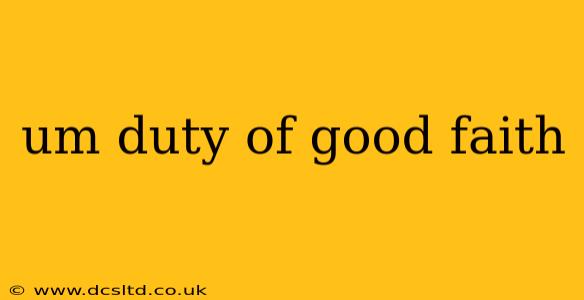The duty of good faith is a fundamental principle in many areas of law, implying that parties to a contract or other legal relationship must act honestly and fairly toward each other. It's not a standalone cause of action in itself, but rather an overarching principle that permeates various legal contexts, influencing how courts interpret and enforce agreements. This guide will explore this crucial legal concept in detail.
What is the Duty of Good Faith?
The duty of good faith requires parties to a contract to act honestly and fairly in their dealings with each other. It's not simply about avoiding outright fraud or dishonesty; it encompasses a broader obligation to act in a way that is consistent with the reasonable expectations of the other party. This duty is implied in most contracts, even if it isn't explicitly stated. The exact scope of the duty can vary depending on the specific context and jurisdiction. In essence, it's a commitment to collaborative performance, not opportunistic exploitation.
Where Does the Duty of Good Faith Apply?
The duty of good faith finds application in numerous areas of law, including:
- Contract Law: This is perhaps the most common area where the duty of good faith arises. It affects the interpretation, performance, and enforcement of contracts. For example, a party cannot intentionally obstruct the other party's performance of the contract, even if technically compliant with the letter of the agreement.
- Insurance Law: Insurers owe a duty of good faith to their policyholders in handling claims. This means acting promptly, fairly, and transparently in investigating and settling claims. Failure to uphold this duty can lead to bad faith claims against the insurer.
- Partnership Law: Partners in a business owe each other a duty of good faith and fair dealing. This requires them to act in the best interests of the partnership and to avoid self-dealing or conflicts of interest.
- Real Estate Law: The duty of good faith is also relevant in real estate transactions, particularly during negotiations and the closing process.
- Employment Law: While the specifics vary depending on jurisdiction, some employment laws incorporate elements of a good faith requirement, particularly regarding termination of employment.
What Does a Breach of the Duty of Good Faith Entail?
A breach of the duty of good faith occurs when a party acts dishonestly or unfairly toward the other party in a way that violates the reasonable expectations of the relationship. This can manifest in various ways, such as:
- Intentionally misleading the other party: Providing false or incomplete information to gain an advantage.
- Failing to cooperate in the performance of the contract: Actively hindering the other party's ability to fulfill their obligations.
- Exploiting a loophole in the contract to gain an unfair advantage: Taking advantage of a technicality to circumvent the spirit of the agreement.
- Arbitrarily refusing to perform contractual obligations: Without legitimate reason or justification.
Consequences of breaching the duty of good faith can vary, depending on the specific circumstances and jurisdiction. Remedies may include:
- Damages: Compensation for financial losses incurred as a result of the breach.
- Specific Performance: A court order requiring the breaching party to fulfill their contractual obligations.
- Rescission: Cancellation of the contract.
- Injunctive Relief: A court order prohibiting the breaching party from taking certain actions.
What is the Difference Between the Duty of Good Faith and Fair Dealing?
The terms "duty of good faith" and "duty of fair dealing" are often used interchangeably, and in many jurisdictions, they are essentially the same. However, some legal scholars make a distinction, suggesting that "good faith" focuses on honesty in intent, while "fair dealing" emphasizes equitable treatment and the reasonable expectations of the parties involved. The practical difference is often minimal.
How is the Duty of Good Faith Proven in Court?
Proving a breach of the duty of good faith often requires demonstrating that the other party acted dishonestly or unfairly, violating the reasonable expectations of the relationship. This typically involves presenting evidence such as:
- Communication records: Emails, letters, or other documentation that shows the other party's intent or actions.
- Witness testimony: Accounts from individuals who witnessed the relevant events.
- Expert testimony: Opinions from legal or other experts on the relevant aspects of the case.
Is the Duty of Good Faith Always Implied in Contracts?
While the duty of good faith is implied in many contracts, it's important to note that the specific application and scope can vary by jurisdiction. In some jurisdictions, it is explicitly stated in legislation, while in others, it is implied by common law. Always consult with a legal professional to determine how this principle applies to a specific contract or situation.
This information is for educational purposes only and should not be considered legal advice. Consult with a legal professional for advice tailored to your specific situation.
